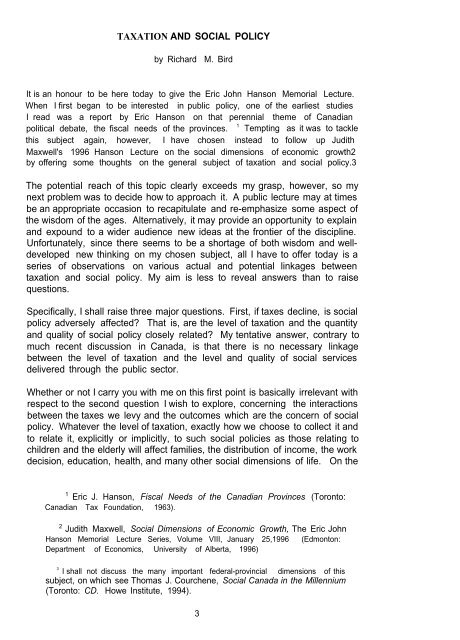Richard Bird - Institute for Public Economics - University of Alberta
Richard Bird - Institute for Public Economics - University of Alberta
Richard Bird - Institute for Public Economics - University of Alberta
Create successful ePaper yourself
Turn your PDF publications into a flip-book with our unique Google optimized e-Paper software.
TAXATION AND SOCIAL POLICYby <strong>Richard</strong>M. <strong>Bird</strong>It is an honour to be here today to give the Eric John Hanson Memorial Lecture.When I first began to be interested in public policy, one <strong>of</strong> the earliest studiesI read was a report by Eric Hanson on that perennial theme <strong>of</strong> Canadianpolitical debate, the fiscal needs <strong>of</strong> the provinces.1Tempting as it was to tacklethis subject again, however, I have chosen instead to follow up JudithMaxwell's 1996 Hanson Lecture on the social dimensions <strong>of</strong> economic growth2by <strong>of</strong>fering some thoughts on the general subject <strong>of</strong> taxation and social policy.3The potential reach <strong>of</strong> this topic clearly exceeds my grasp, however, so mynext problem was to decide how to approach it. A public lecture may at timesbe an appropriate occasion to recapitulate and re-emphasize some aspect <strong>of</strong>the wisdom <strong>of</strong> the ages. Alternatively, it may provide an opportunity to explainand expound to a wider audience new ideas at the frontier <strong>of</strong> the discipline.Un<strong>for</strong>tunately, since there seems to be a shortage <strong>of</strong> both wisdom and welldevelopednew thinking on my chosen subject, all I have to <strong>of</strong>fer today is aseries <strong>of</strong> observations on various actual and potential linkages betweentaxation and social policy. My aim is less to reveal answers than to raisequestions.Specifically, I shall raise three major questions. First, if taxes decline, is socialpolicy adversely affected? That is, are the level <strong>of</strong> taxation and the quantityand quality <strong>of</strong> social policy closely related? My tentative answer, contrary tomuch recent discussion in Canada, is that there is no necessary linkagebetween the level <strong>of</strong> taxation and the level and quality <strong>of</strong> social servicesdelivered through the public sector.Whether or not I carry you with me on this first point is basically irrelevant withrespect to the second question I wish to explore, concerning the interactionsbetween the taxes we levy and the outcomes which are the concern <strong>of</strong> socialpolicy. Whatever the level <strong>of</strong> taxation, exactly how we choose to collect it andto relate it, explicitly or implicitly, to such social policies as those relating tochildren and the elderly will affect families, the distribution <strong>of</strong> income, the workdecision, education, health, and many other social dimensions <strong>of</strong> life. On the1 Eric J. Hanson, Fiscal Needs <strong>of</strong> the Canadian Provinces (Toronto:Canadian Tax Foundation, 1963).2 Judith Maxwell, Social Dimensions <strong>of</strong> Economic Growth, The Eric JohnHanson Memorial Lecture Series, Volume VIII, January 25,1996 (Edmonton:Department <strong>of</strong> <strong>Economics</strong>, <strong>University</strong> <strong>of</strong> <strong>Alberta</strong>, 1996)3I shall not discuss the many important federal-provincial dimensions <strong>of</strong> thissubject, on which see Thomas J. Courchene, Social Canada in the Millennium(Toronto: CD. Howe <strong>Institute</strong>, 1994).3



